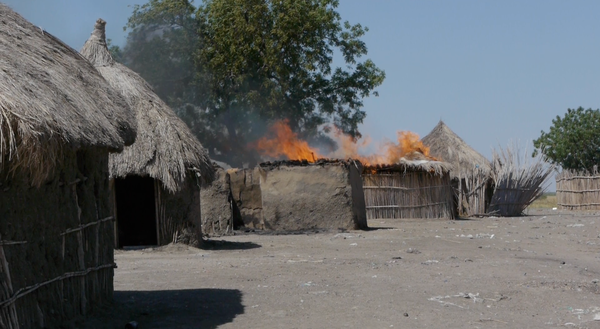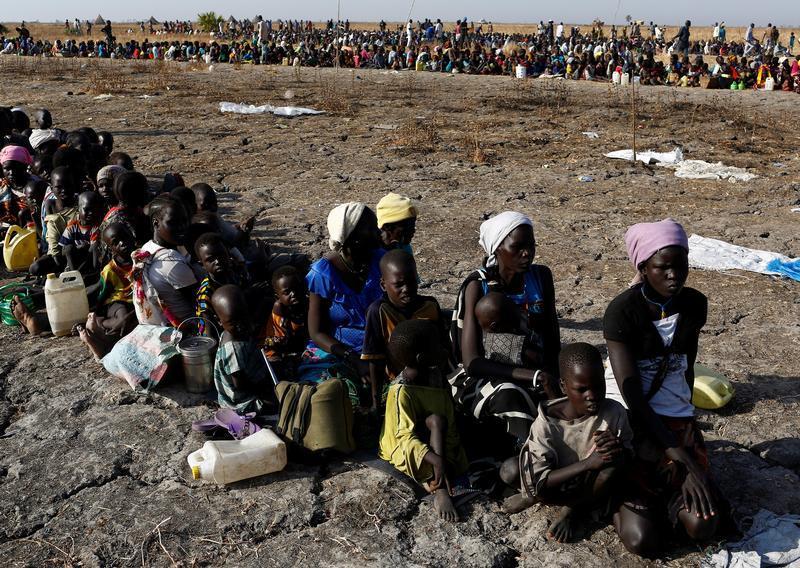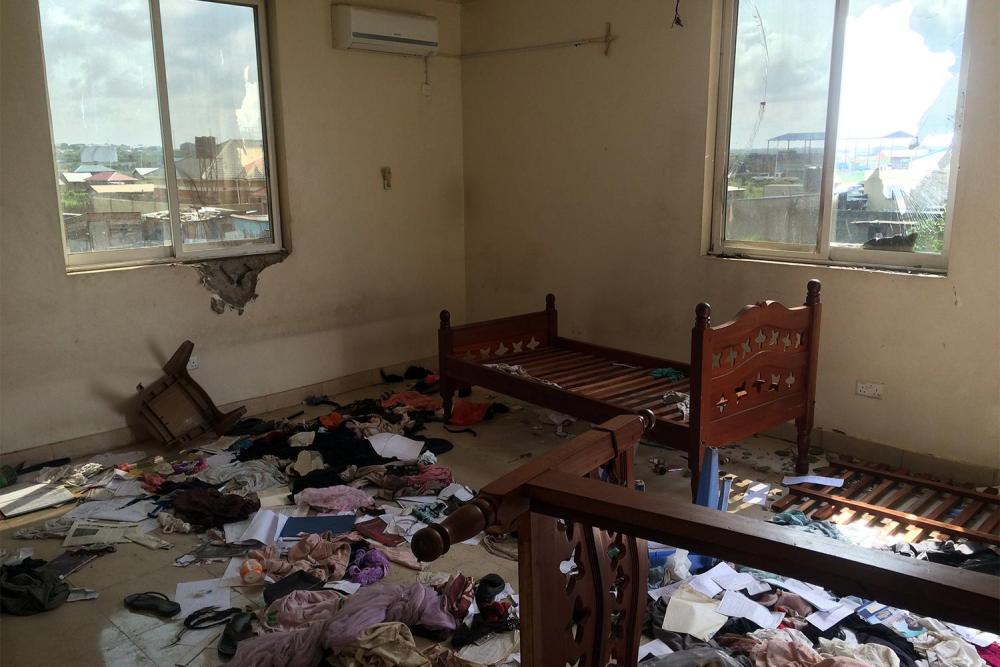Update December 15 2017: On December 13 as Human Rights Watch was going to press, South Sudan’s council of ministers reportedly approved the hybrid court statute and the government’s memorandum of understanding with the African Union. Human Rights Watch calls on the government to move promptly to take the next steps necessary to ensure the court becomes operational as soon as possible.
(Nairobi) – South Sudan’s top officials have failed to make good on promises to establish an African Union-South Sudanese hybrid court to try international crimes committed during the country’s civil war, Human Rights Watch said today. Four years into the conflict, both parties continue to commit grave human rights crimes against civilians.
Despite the August 2015 Agreement on the Resolution of Conflict in South Sudan (ARCSS), which envisioned the hybrid court, abuses by all parties persist as the conflict continues to spread. South Sudan’s transitional government has neither ended violations by its army nor made progress toward setting up the court. The lack of progress points to the need for measures like targeted sanctions against officials responsible and an arms embargo, Human Rights Watch said.
“The government has consistently let deadlines slip while its forces commit crimes with impunity” said Mausi Segun, Africa director at Human Rights Watch. “The people of South Sudan deserve justice, not a chain of broken promises, and so the international community should impose consequences.”
In September 2017, the AU Peace and Security Council issued a communiqué on South Sudan, warning that it would consider necessary steps, including sanctions, should the South Sudanese parties continue to delay implementing the peace agreement in full. The United States ambassador to the United Nations, Nikki Haley, during a visit to South Sudan in October, similarly warned of sanctions if the government did not live up to its pledges.
South Sudan’s civil war began on December 15, 2013, when troops loyal to president Salva Kiir – a Dinka – clashed with those of then-Vice-President Riek Machar – a Nuer – in the capital, Juba. Within hours, mainly Dinka government troops carried out large-scale targeted killings, detentions, and torture of mainly Nuer civilians in various parts of Juba, while thousands of Nuer soldiers defected to an opposition army. In the following months, fighting spread to Bor, Bentiu, Malakal, and across the Greater Upper Nile region. As towns changed hands, soldiers on both sides killed thousands of civilians, often based on their ethnicity, and destroyed and pillaged civilian property.
In late 2015, conflict spread to the Equatorias, as new rebel groups claiming an affiliation formed, and government forces carried out deadly counterinsurgency campaigns in previously stable regions south and west of the capital. Government soldiers and allied fighters have attacked civilians sheltering inside the UN bases in Malakal and Juba, in blatant violation of international law. In July 2016, government and opposition forces fought in Juba and government forces attacked, killed, and raped civilians, including displaced people and foreign aid workers. Since the Juba crisis, government forces have continued to fight rebels in Central and Western Equatoria, Unity, and northern Jonglei.
The impact of the violence and abuses is devastating. More than 4 million people have fled their homes, with more than 2 million now refugees in neighboring countries. In February, the UN declared a famine in parts of Unity state, and almost half the country’s population faces acute food shortages.
In October 2015, the AU released the final report of the Commission of Inquiry on South Sudan (AUCoISS), which found that the warring parties had committed grave human rights abuses and war crimes. The commission’s findings were largely consistent with Human Rights Watch reporting, and proposed creating an AU-led process to bring those with the greatest responsibility for the atrocities to account.
The August 2015 agreement included a hybrid court to be established by the AU Commission to investigate and try those responsible for grave abuses since 2013. Under the agreement, the court is to consist of South Sudanese and other African judges and staff. Human Rights Watch findings on significant weaknesses in the national justice system support the need for the court.
More than two years later, the court has yet to be created.
In early 2017, the AU held consultations with the South Sudanese Justice Ministry that led to a draft statute for the court and a memorandum of understanding between the AU and the South Sudanese government on the establishment of the court. Both documents were submitted to the South Sudan council of ministers in August, but the government has taken no further action.
In a September communiqué, the AU Peace and Security Council said the South Sudanese government should expedite creating the court and completing its part of the agreement, or face “necessary steps, including sanction measures, that could ensure effective and efficient implementation” of the agreement.
In December, government officials told Human Rights Watch researchers in Juba that a number of key ministers oppose the court, including the communications minister, Michael Makuei – against whom the US brought sanctions in September for undermining the peace process; the cabinet affairs minister, Martin Elia Lomuro; and the defense minister, Kuol Manyang.
Under the August 2015 agreement, the AU Commission has the authority to establish the court with or without the engagement of the South Sudanese government. If the transitional government continues to ignore its responsibilities under Chapter V of the peace agreement, the AU should proceed with the court on its own, Human Rights Watch said.
If a credible, fair, and independent hybrid court does not progress, the option of the International Criminal Court (ICC) remains and should be pursued, Human Rights Watch said. As South Sudan is not a party to the ICC, the UN Security Council would need to refer the situation to the court in the absence of a request from the government of South Sudan.
“The AU should ensure progress on the hybrid court, if necessary without cooperation from South Sudan’s leaders, or consider coercive measures like targeted sanctions against anyone responsible for obstruction,” Segun said. “If the leaders won’t stand by the victims of atrocities, the African Union should step up and show it won’t abandon this precedent-setting plan for accountability in one of the continent’s worst human rights crises.”
In March 2016, Human Rights Watch documented that government forces carried out killings, enforced disappearances, rapes, and other grave abuses against civilians belonging to Equatorian ethnic groups in the Western Equatoria region. Among those killed was a 34-year-old man arrested by soldiers in the Napere neighborhood of Yambio in November and detained for two months. His brother said he found the body weeks later: “He was tied and his face was rotten. All of his body was rotten. But I recognized him from his clothes, feet, and fingers.” The army commander of Yambio at the time, Col. Makeny Makor Buoy, was neither investigated nor tried. He was rotated to his home region of Lakes.
In Wau, in April 2016, researchers discovered that government soldiers had carried out a wide range of often-deadly attacks on civilians in and around the town, killing, torturing, raping, and detaining and disappearing civilians on the basis of their ethnicity, in addition to looting and burning down homes. A 55-year-old woman said that soldiers came to her village outside of Wau in March and shot her 60-year-old husband in the stomach and her 29-year-old son in the neck: “We were at home and then we heard shooting and we hit the ground and crawled away when a group of soldiers came in. There was no reason for them to target us.” The army commander of Wau at the time, Maj. Gen. Attayib “Taitai” Gatluak, was not investigated for his role in the crimes committed by his forces there, and has faced no charges for his participation in, or command responsibility for, any crimes.
Government soldiers killed at least 73 civilians, raped dozens of women, and extensively looted civilian property, including humanitarian goods, during and after clashes between government and opposition forces in Juba in July 2016. In many cases, government forces appeared to target non-Dinka civilians. A 35-year-old man said that two army picks-ups surrounded the hotel where he hid with 27 other Nuer men shortly before a ceasefire ended the fighting on July 11. A soldier knocked at the door and asked if any Nuer were staying there. “We urged the guard not to open. They asked, ‘Why are you hiding Nuer!’ and then they started to shoot with their heavy machine guns through the doors and wall. That’s how my friend Mading Chan was killed.”
The same day, a large number of soldiers overran the Terrain compound that housed a number of international organizations, executed a Nuer journalist, raped and gang-raped several women, and assaulted dozens of staff. International pressure led the government to establish an ad hoc tribunal to try armed personnel responsible for the attack, but no credible investigation was carried out to determine the responsibility for the scores of South Sudanese women raped, or civilians killed during and after the fighting officially ended in Juba on July 11.
The army chief of staff at the time, Paul Malong Awan, was replaced in April 2017, and has yet to be subject to criminal investigation to determine his responsibility for crimes committed while he was in command. He has since left South Sudan for Kenya.
In October 2016, researchers found that government and opposition forces had committed serious abuses in Yei, including killings, rapes, and arbitrary arrests by the army, and abductions by the rebels. On October 8, rebels ambushed a convoy of civilians leaving Yei and shot indiscriminately at a truck, then set it on fire. An 11-year-old boy who survived the attack said: “They started to shoot and I lay down [in the truck]. Others fell on top of me. One had been shot to the head.”
In mid-November 2016, an international journalist found seven charred bodies in a mud house in the outskirts of Yei, in a government-controlled area. Witnesses quoted by the Associated Press said the deceased were civilians who had been abducted and killed by men wearing uniforms. More than a dozen former detainees, released at the time of the Human Rights Watch visit, said they had been held by government forces in overcrowded cells in Yei with little food and water and routinely beaten and tortured.
In refugee camps in northern Uganda in May 2017, researchers heard from South Sudanese refugees that government forces indiscriminately fired into civilian settlements in the Equatoria region during counterinsurgency operations, killing many civilians. The attacks forced over a million South Sudanese to abandon their homes and livelihoods and flee across the border.
A woman from Kajo Keji county said that soldiers killed her husband and her two children, ages 5 and 10, while she was cooking dinner at home in January 2017: “About 10 soldiers came to our house. My son told me they had come, and my husband went out. They shot him. Then my other son followed him and they shot both boys. One soldier ran after me and severely twisted my arm. I managed to get away. And I just ran. With one arm, how do I care for my other children and my mother? I want to commit suicide.”














